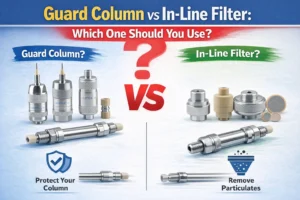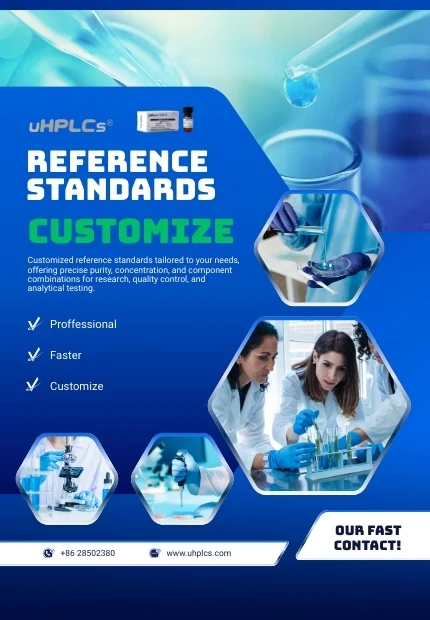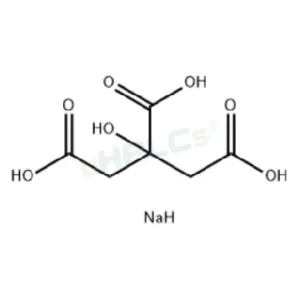
Guard Column vs In-Line Filter: Which One Should You Use?
In HPLC, most performance problems don’t start at the detector — they start before the column. High back
Home » Vitamin Reference Standards
At uHPLCs, we are dedicated to producing high-quality reference standards that meet the rigorous demands of pharmaceutical, food, and research laboratories.
Our Vitamin Reference Standards are specially developed to support accurate testing, regulatory compliance, and reliable results across drug development, nutritional analysis, and clinical research. By ensuring precision, traceability, and consistency, we help laboratories achieve dependable outcomes in HPLC, LC-MS, and quality control (QC) testing.
We offer a comprehensive portfolio of certified reference standards, including:
To meet unique project requirements, we also provide custom preparation services, delivering specialized solutions that match your exact testing and regulatory needs.
With uHPLCs Vitamin Reference Standards, you can ensure the highest level of accuracy, reliability, and compliance for your critical analyses.
Get Expert Guidance and Customized Solutions for Accurate Reference Standards

uHPLCs provides a comprehensive portfolio of reference standards, covering:
This wide coverage reduces the need to source from multiple suppliers, ensuring consistency, reliability, and efficiency for laboratories and research facilities.


This flexibility makes uHPLCs an ideal partner for academic labs, pharmaceutical companies, and industrial QC teams.
At uHPLCs, we understand that every laboratory, research project, and industrial application may require unique reference standards beyond standard catalogs. That’s why we provide a tailored Custom Reference Standards Service designed to meet your specific analytical and regulatory needs.

 What We Offer
What We Offer Why Choose uHPLCs Custom Service?
Why Choose uHPLCs Custom Service?




As Follow is Some Frequently Questions People Asked
Vitamin Reference Standards are high-purity, certified substances used as benchmarks in analytical testing. They serve as a known point of reference for HPLC, LC-MS, UV spectrophotometry, and other analytical techniques.
In pharmaceutical manufacturing, they ensure the correct identity, potency, and purity of active ingredients like Vitamin A, B-complex, C, D, E, and K.
For food and nutritional industries, they support labeling accuracy and regulatory compliance, helping companies meet standards set by USP, EP, and ISO.
Without reliable reference standards, test results can become inconsistent, leading to failed audits, product recalls, or regulatory penalties.
uHPLCs offers a comprehensive range of vitamin standards, covering all key categories required for pharmaceutical and food testing:
Each standard is accompanied by Certificate of Analysis (CoA) with purity, lot number, and traceability information.
Vitamin reference standards are essential across multiple industries:
Pharmaceutical Manufacturers: For drug formulation, stability studies, and GMP-compliant quality control.
Nutritional Supplement Companies: To verify label claims for vitamin content and ensure regulatory compliance.
Food & Beverage Industry: To confirm fortification levels and labeling accuracy, particularly for fortified cereals, juices, and dairy products.
Third-Party Testing Labs: Providing independent verification services to clients.
Research & Academia: Supporting discovery projects, metabolic studies, and scientific publications.
By serving diverse industries, uHPLCs ensures testing accuracy and international compliance.
Yes. uHPLCs supplies Vitamin Reference Standards that are manufactured and verified under ISO/IEC 17025 and ISO 9001 quality management systems.
Many of our standards are traceable to pharmacopeial requirements such as:
USP (United States Pharmacopeia)
EP (European Pharmacopoeia)
JP (Japanese Pharmacopoeia)
This ensures that they are suitable for use in regulated environments, including pharmaceutical product registration, regulatory audits, and international compliance. Each batch is supported with extensive documentation, including a detailed CoA, MSDS, and stability data.
Proper storage and handling are critical to maintaining the integrity and purity of vitamin standards:
Temperature Control: Most vitamin standards should be stored at 2–8°C (refrigerated); sensitive vitamins like Vitamin A and D may require freezer storage (-20°C).
Protection from Light: Fat-soluble vitamins degrade quickly under UV exposure; store them in amber vials or foil wrapping.
Humidity Control: Vitamins such as Vitamin C are highly hygroscopic and must be kept in desiccators or moisture-controlled environments.
Handling: Use clean, calibrated tools to avoid contamination, and always reseal containers tightly after opening.
uHPLCs provides detailed storage instructions with each shipment to help clients preserve product quality.
Every uHPLCs Vitamin Reference Standard shipment includes a comprehensive documentation package to ensure traceability and compliance:
Certificate of Analysis (CoA): Detailing purity, lot number, expiration date, and analytical methods used.
Material Safety Data Sheet (MSDS): For safe handling and regulatory compliance.
Batch Records: Traceability information for audits and GMP documentation.
Stability & Storage Data: Guidelines to maintain standard integrity over time.
These documents help laboratories pass regulatory inspections and maintain strict quality management systems.
Yes. uHPLCs provides flexible solutions for diverse client needs:
Bulk Supply: Available for high-volume pharmaceutical or food production facilities, with consistent lot control and long-term supply agreements.
Custom Preparation: Tailored vitamin standards for unique research projects or specialized formulations, including custom concentrations, solvent blends, or packaging formats.
Private Labeling: For labs or distributors seeking branded solutions.
Our technical team works closely with clients to design and deliver standards that meet both technical and regulatory requirements.
Vitamin Reference Standards are mandatory for demonstrating regulatory compliance in pharmaceutical and food industries. They:
Validate Analytical Methods: Proving that HPLC, LC-MS, or titration methods are accurate and reproducible.
Support GMP & ISO Certification: Proper use of traceable standards ensures compliance with global guidelines.
Provide Documentation for Audits: CoA and batch records serve as evidence during FDA, EMA, or ISO inspections.
Reduce Risk: High-quality reference standards prevent failed batches, recalls, or labeling violations.
By using uHPLCs certified standards, clients safeguard their reputation and maintain smooth regulatory relationships.
uHPLCs combines technical expertise, global regulatory knowledge, and flexible production capacity to deliver exceptional value:
Wide product portfolio covering all major vitamins (A, B-complex, C, D, E, K).
Strict adherence to ISO and GMP standards for quality and traceability.
Custom preparation and bulk supply options for pharmaceutical and food industries.
Competitive global logistics ensuring timely, temperature-controlled delivery.
Dedicated technical support team for documentation, audits, and compliance guidance.
By partnering with uHPLCs, clients gain a reliable, long-term supplier who understands the complex needs of the vitamin testing and manufacturing market.
Vitamin Reference Standards are mandatory for demonstrating regulatory compliance in pharmaceutical and food industries. They:
Validate Analytical Methods: Proving that HPLC, LC-MS, or titration methods are accurate and reproducible.
Support GMP & ISO Certification: Proper use of traceable standards ensures compliance with global guidelines.
Provide Documentation for Audits: CoA and batch records serve as evidence during FDA, EMA, or ISO inspections.
Reduce Risk: High-quality reference standards prevent failed batches, recalls, or labeling violations.
By using uHPLCs certified standards, clients safeguard their reputation and maintain smooth regulatory relationships.
Contact uHPLCs Today for Any Questions for HPLC / UHPLC

In HPLC, most performance problems don’t start at the detector — they start before the column. High back

Uridine 5’-triphosphate Trisodium Salt (UTP-Na₃) Reference Standard | CAS 19817-92-6 | High-Purity Reference Materiel Product Code: U-D25015X Chemical

Glutathione (G-SH) Reference Standard | CAS 70-18-8 | High-Purity Reference Materiel Product Code: G-D25016X Chemical Name: Glutathione (G-SH)

Adenosine 5’-triphosphate Disodium Salt Reference Standard | CAS 987-65-5 | High-Purity Reference Materiel Product Code: A-D25014X Chemical Name:

Butafosfan Reference Standard | CAS 17316-67-5 | High-Purity Reference Materiel Product Code: B-D25013X Chemical Name: Butafosfan Category: Drug

Calcium Gluconate Reference Standard | CAS 299-28-5 | High-Purity Reference Materiel Product Code: C-D25012X Chemical Name: Calcium Gluconate

Magnesium L-aspartate Reference Standard | CAS 2068-80-6 | High-Purity Reference Materiel Product Code: M-D25011X Chemical Name: Magnesium L-aspartate
WhatsApp us
Subscribe for exclusive offers and updates on new arrivals